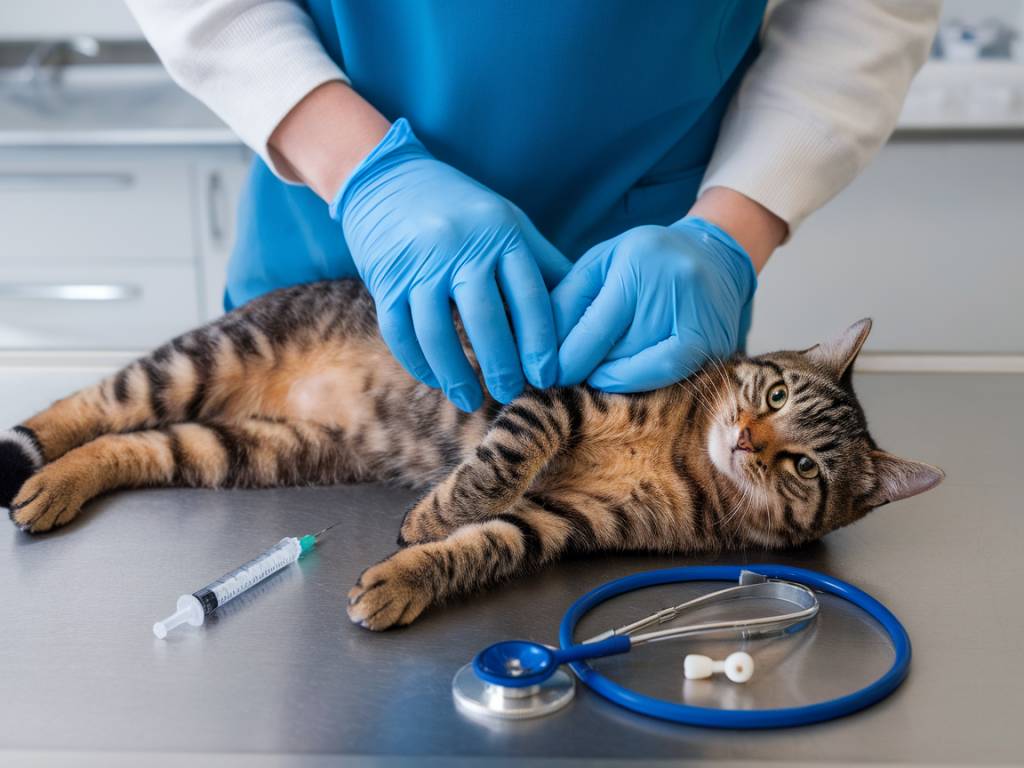« `html
The Importance of Regular Vet Checkups for Detecting Early Signs of Health Issues in Cats
Cats are masters at hiding their ailments. Unlike dogs, who might whimper or show signs of discomfort, cats tend to conceal their pain and sickness. This instinctual behavior harks back to their wild ancestors, where showing vulnerability could make them prey. As a result, cat owners often don’t realize there’s a problem until it becomes severe. This is why regular veterinary checkups are crucial. They can catch early signs of health issues in cats, ensuring that our feline friends live healthy and happy lives.
Building a Preventive Health Routine
Regular vet checkups should be a cornerstone of your cat’s health routine. Just as humans benefit from annual physicals, cats need similar regular assessments to ensure everything is functioning as it should. During a checkup, veterinarians conduct physical examinations, checking for any abnormalities or changes in your cat’s body condition. This comprehensive review can often reveal underlying issues that aren’t easily observable at home.
Moreover, these visits are an opportunity to update essential vaccines, discuss diet and weight management, and review any behavioral changes you might have noticed. A preventive approach is always better than reactive care. By keeping up with regular checkups, you can prevent minor issues from evolving into major health crises.
Spotting Subtle Symptoms Early
One of the significant benefits of routine vet visits is the ability to spot diseases and health issues in their early stages. Some conditions, like kidney disease or diabetes, show subtle symptoms that you might attribute to normal aging in cats. A vet, however, knows what signs to look for and can catch these problems before they become life-threatening.
During a checkup, a vet may notice slight changes in a cat’s weight, coat condition, or behavior—all of which can indicate potential health issues. Early detection is key. For example, catching kidney disease in its early stages can significantly improve your cat’s quality of life and longevity through medication, diet changes, and proper monitoring.
Understanding the Role of Vaccinations and Parasite Control
Vaccinations are a crucial component of your cat’s healthcare routine. They protect your cat from common diseases that can have severe consequences. Through regular vet checkups, your cat will always stay up to date with the necessary vaccinations, providing immunity against illnesses such as feline leukemia and rabies.
Parasite control is another reason why regular vet visits are essential. Fleas, ticks, and worms are not just nuisances but can also lead to severe health issues if untreated. Your vet can recommend preventive treatments and identify any parasite-related problems early, preventing further complications.
Discussing Nutrition and Diet Changes
Diet plays a pivotal role in a cat’s overall health. Cat owners often don’t realize that the wrong diet can lead to obesity, diabetes, and other serious conditions. During regular checkups, you have the opportunity to discuss your cat’s diet with a professional. A vet can recommend special diets or nutritional supplements tailored to your cat’s needs, ensuring they maintain optimal health and weight.
Furthermore, if your cat has specific health conditions, such as kidney issues or food allergies, a vet can assist in creating or adjusting a diet plan to manage these problems effectively. Feeding your cat a balanced and appropriate diet is a proactive step in preventing health issues from arising.
Monitoring Dental Health
Cats, like humans, can suffer from a range of dental issues that can significantly affect their overall well-being. From gingivitis to tooth resorption, dental problems can lead to pain, infection, and even affect a cat’s internal organs if bacteria enter the bloodstream.
Regular vet checkups include dental examinations where vets can identify early signs of dental issues. They might recommend professional dental cleanings or advise on at-home dental care routines, such as brushing or dental treats, to help maintain your cat’s oral health.
Behavioral Assessments and Guidance
Behavioral changes are often the first indicators of a health issue in cats. A cat that suddenly becomes aggressive, hides more often, or changes its litter box habits may be signaling a medical problem. Regular vet checkups provide an opportunity to discuss such changes with a professional who can help determine if there’s an underlying health issue.
Additionally, your vet can offer guidance on environmental enrichment and behavior management techniques to ensure your cat’s mental and emotional well-being, complementing their physical health care.
Establishing a Baseline for Health
Having consistent veterinary records over the years helps establish a health baseline for your cat. With each visit, your veterinarian creates a comprehensive profile of your cat’s normal health metrics. This information is invaluable in detecting any deviations from the norm, making it easier to identify potential health issues quickly.
Establishing a baseline also aids in making informed decisions about treatments if an illness does occur. Knowing what is normal for your cat heightens the chances of a successful outcome when dealing with any future health concerns.
Creating a Strong Vet-Client Relationship
Regular vet checkups help build a strong relationship between you, your cat, and the veterinarian. When your vet knows your cat well, they can provide tailored advice and make more accurate diagnoses. This relationship becomes especially important in emergencies, as a vet who knows your cat’s history can often make quicker, more informed recommendations.
A strong partnership with your vet enhances your cat’s healthcare experience, ensuring that they receive compassionate and personalized care throughout their life.
In summary, regular vet checkups are an essential aspect of responsible cat ownership. By prioritizing these visits, you’re investing in your cat’s long-term health and happiness. Detecting potential health issues early can not only save you money in the long run but, more importantly, can ensure that your feline friend remains a cherished companion for many years to come.
Lisa Tissed
« `

